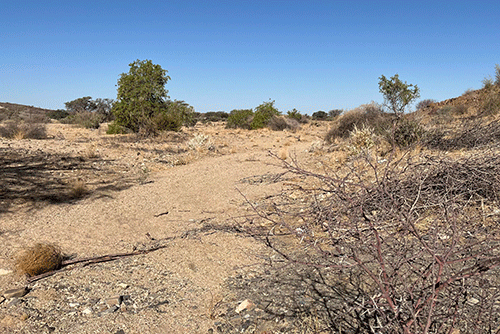UIS - The water supply situation in the Erongo region has reached a crisis point, with potential dire consequences for communities in settlements like Uis, Otjimbingwe and Omatjete.
Erongo is one of the hardest-hit regions, and has been experiencing a persistent drought for almost seven years. President Nangolo Mbumba declared a state of emergency regarding the current drought, effective 22 May.
The situation in Uis is exacerbated not only by the severe drought, but also by ailing infrastructure. A delegation from the Erongo Regional Council visited these heavily-affected areas last weekend to assess the situation on the ground, and develop workable solutions as soon as possible. Uis is home to about 5 000 residents, but despite mining operations in the area, many residents struggle with unemployment.
Erongo’s chief regional officer Mupenzeni Ntelamo said the water pipes in some towns are old and broken, with some still made of asbestos.
“Especially in Uis, the water pressure is very low because the pipes are clogged. This means the water cannot reach the upper town, where the community, including two schools, lives,” he noted.
Ntelamo said an interim solution would involve installing plastic pipes to connect the reservoir to the community, about a kilometre away, as soon as possible.
“The situation is a health hazard, especially with children writing examinations. We only have a tanker providing water to this community, which is a considerable risk,” Ntelamo added.
Dry boreholes
The chief regional officer indicated that the region overall has not seen sufficient rain for years and that the aquifers have not been replenished, leading to dry
boreholes.
Karibib constituency councillor Melania Ndjago said her constituency has been severely affected by the drought, posing challenges for both farmers and families.
“The 2024–2025 season is expected to see a continuation of the 2023 drought, with disastrous results. Consistent crop failure due to insufficient rainfall, resulting in food shortages and livestock mortality due to a lack of grazing and fodder, are the main challenges being faced in my constituency,” the worried politician stated.
Ndjago added that there are renewed calls on the government to provide seeds for the next planting season, build infrastructure to pump water from various aquifers, and drill, maintain and renovate boreholes in the drought-affected
areas of the Erongo, //Kharas and Kunene regions.
“The water levels in the Swakoppoort Dam are very low, and it is a worrisome situation. NamWater is currently pumping water to areas in need. The government has provided trucks to carry water to areas where the water pressure is low. I must say that the challenges experienced in Otjimbingwe regarding water were solved successfully,” she continued.
Walvis Bay Rural constituency councillor Florian Donatus reported that although the drought is not severely felt in his constituency, its ripple-effects are evident, especially in areas such as Tutaleni, Twaloloka and Otweya in Walvis Bay.
“My office has been inundated with requests for assistance. Many people depended on mahangu from their families, but the drought has affected the harvest, resulting in less mahangu reaching rural areas. People are hungry, and it is not just a settlement issue. We have people struggling to make ends meet in rural areas,” he emphasised.
Daures constituency councillor Kennedy !Haoseb told New Era yesterday that the situation in his constituency is of great concern.
“Water is a critical need, and we as a council are committed, along with the government, to alleviate this issue. It is not only a water shortage that we are dealing with, but also increased food scarcity among already-affected communities,” he said.
Chairperson of the council Benita Imbamba earlier indicated that the region, in collaboration with the Office of the Prime Minister and the agriculture ministry, is installing a 23-kilometre pipeline. This pipeline will bring much relief to the water-deprived communities in Daures, which have suffered a merciless onslaught of drought for the past seven years.


